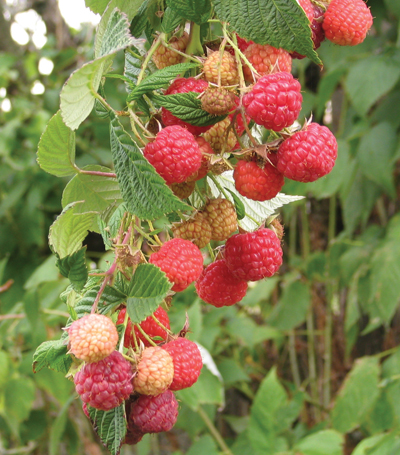
Features
Production
Research
Raspberry variety selection helps with disease control
March 27, 2009 By Hugh McElhone
The key to a productive, healthy raspberry planting is disease control.
One way to help control the spread of disease is through fall pruning,
says Mike Ellis, a plant pathologist with Ohio State University.
 |
|
| The key to a productive, healthy raspberry planting is disease control, either through maintenance, sprays, or variety selection.
|
The key to a productive, healthy raspberry planting is disease control. One way to help control the spread of disease is through fall pruning, says Mike Ellis, a plant pathologist with Ohio State University.
“Getting the canes cut, then mowing them with a flail (mower), is the best for sanitation plus it adds organic matter to the soil,” he says.
Timely lime sulphur sprays are also important for controlling anthracnose on the canes. Ellis has recently worked with Sulforix, a different formulation of lime sulphur, and had good results. “There’s better penetration, and you need less,” he explains.
One gallon of Sulforix is equal in strength to four gallons of lime sulphur, Ellis says, although lime sulphur is still cheaper per acre despite needing to apply more volume. Cost effectiveness is best determined by the grower, who may want to spend a little more and save time covering more acres with fewer tank loads, he says.
Botrytis fruit rot in raspberries is best combated with timely fungicide sprays, especially during a wet season, says Ellis. “The new chemistry fungicides are amazing in their control,” he notes. Still, they need to be used in rotation to fight botrytis resistance, and growers should be mindful of the pre-harvest interval so there is no residue on the fruit, he says.
If the crop is not sprayed and botrytis moves in, Ellis says the canes will soon shut down and dry up while the fruit will rot quickly. Fruit that appears clean, but is picked from an infected area, should be moved immediately to the cooler and shipped to market within 24 hours of picking.
Ellis has found that raspberry vulnerability to leaf spot and powdery mildew can tend to be variety specific. For example, Ellis has found that Nova has higher resistance to both diseases compared to other varieties, such as Titan.
“Variety selection is very important,” he says. “If the variety you have is susceptible to both diseases, get rid of it. It’s too much work and too costly to spray.”
Some varieties are also good indicators of phytophthora root rot being present in the soil. While no variety is resistant, one variety may be more apt than another to catch it. “Good drainage is so important,” Ellis stresses, adding that raspberry canes may need to be planted in beds raised 10 inches or more to prevent “wet feet.” Timely fungicide sprays will also offer protection, he says.
Certain varieties are highly susceptible to orange rust, also known as leaf rust, explains Ellis. Orange rust moves systemically through the plant and will infect the leaves, buds and fruit, he says, adding the disease will slowly but steadily spread to other plants and the fruit will be unsaleable.
Because it is systemic, Ellis says the best remedy is to remove the infected plants, roots and all. “Nova has demonstrated good control and resists orange rust but it can’t stop it.” He adds the variety should be removed if infected.
No variety is resistant to winter injury, says Ellis. Long, cold winter temperatures can damage canes, and those on wind-blown knolls are most susceptible. Sudden temperature drops in the spring to as low as minus 10 degrees Celsius can damage or kill buds.
“Nice primocanes with dead tips are from winter injury,” says Ellis. “You can also have one cane alive and the next one dead.
“There is nothing I know of to spray to help (plants) overwinter. Good nutrition is generally the key to helping them.”
Ellis does caution, however, that applications of nitrogen late in the growing season are “the kiss of death,” and will guarantee winter injury. ❦
Print this page